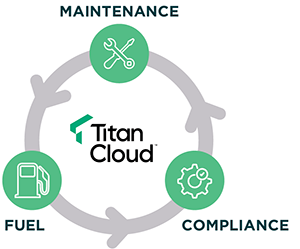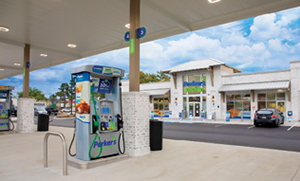 John Huettel Chief Revenue Officer Titan Cloud
John Huettel Chief Revenue Officer Titan Cloud
 Josh Cohen Fuel Logistics Manager Parker’s Kitchen
Josh Cohen Fuel Logistics Manager Parker’s Kitchen
Managing fuel assets has become increasingly complex in recent years. From extreme weather to fuel theft to fuel releases, operators are continually dealing with interruptions and volatility in managing their fuel inventory and ongoing facility maintenance to stay compliant. Furthermore, fuel merchants are dealing with more stringent regulations on how and what they track and report in their fueling business, as well as increased competition and margin pressures.
“Fuel retailers are now managing and tracking more data than they ever have,” said John Huettel, chief revenue officer, Titan Cloud. “They’re at a breaking point and are looking at smarter solutions in compliance, maintenance and fuel operations to drive profits and reduce risk.”
However, traditional tools that are primarily driven by hardware providers force convenience store operators to work in data silos, which only makes their operations more complex. Different departments tend to support their operations using different systems and tools, such as spreadsheets and multiple point solutions. Most legacy systems were not designed with information sharing in mind. Each solution stores and handles data differently, making it difficult to share data sets with stakeholders from other departments or external partners.
Eliminate Silos. Unify Workflows.
While fuel management is moving toward digitalization, other retail sectors are far ahead of the fuel industry in terms of integrating digital technologies. In fact, many convenience and fuel retailers still manage critical operations on paper, spreadsheets and outdated in-house systems. This was the case for Savannah, Georgia-based Parker’s Kitchen.

“We were using multiple point solutions to manage our fuel assets,” said Josh Cohen, fuel logistics manager, Parker’s Kitchen. “The team would access inventory in one system and then need to use another system for water levels and alarm data. There was no integration or consolidated view, which made things challenging to manage.”
“What we’re seeing in the market is that businesses have data, but a lot of it is unstructured, it’s not in one place, and it is not at the level of granularity required,” said Huettel. “We solve that problem and put the data into automated workflows and processes where they can manage it day to day and manage it at scale.”
On top of needing to streamline its fuel asset management, Parker’s Kitchen is planning to double its current store footprint, adding 75 locations to its existing 75-location portfolio over the next five years. The leadership team saw that the company’s software strategy needed an upgrade.
“We needed a single platform to connect all of our fuel data including inventory, tank sizes, water levels, fuel yield, inspections and testing, alarm alerts and more—to act quickly and precisely with the real-time insights,” he said. “Titan’s software-first, hardware-agnostic approach provided us with the connectivity, operational flexibility and scale we needed, allowing us to simplify and proactively manage the dynamic needs of our fuel ecosystem.”
Parker’s Kitchen uses Titan Cloud’s suite of tools to increase productivity and profitability, as well as to reduce environmental risk and improve the workflow for its fuel assets. This has helped the retailer to automate monthly compliance reporting, avoid fines, maintain uptime at the forecourt and become far more effective in vendor and process control.
Titan Cloud’s customers also benefit from flexibility and smart analytics powered by the cloud, allowing teams to continuously track every drop of fuel inventory as it arrives at the site, enters the tank, flows through each fuel line and reaches the meter with incredible accuracy—even at the most complex, high-throughput sites.
A Powerful Trifecta for Fuel Management
Titan Cloud provides enterprise cloud software that digitizes all things fuel on a single platform, allowing retailers to better manage their fuel assets, or what Titan Cloud calls “Fuel Asset Optimization.” The company has a multidimensional value proposition, which helps its clients in three core areas: reducing the risk in environmental compliance, decreasing operating costs and increasing fuel sales and profits.
Trusted by the biggest brands in the convenience store, wholesale distribution and commercial fleet markets, Titan Cloud is the system of record for more than 700 global customers, providing real-time insights at more than 65,000 facilities.

“It’s really about convenience stores getting smarter about every aspect of their business so that they not only have visibility, but they can also respond in a way to completely optimize their operations,” Huettel explained. “And as operations become more connected, it brings an opportunity for major digital transformation.”
Harnessing IoT data from tanks, facilities and other fuel equipment and management software, Titan’s integrated platform provides actionable insights and measurable ROI to deliver more efficient, profitable, and sustainable operations.
Driving Value Across Compliance, Maintenance and Fuel
Streamlined data sharing made possible by Titan’s API integrations allow fuel operators to connect their most critical third-party applications and work from a single source of truth. Furthermore, the data is presented in a variety of ways, such as a dashboard, daily and weekly reports or workflows that trigger a notification to act on critical tasks that need to be done.
“This is where the benefits of optimizing fuel assets come into play,” added Huettel. “When companies recognize the value of combining compliance, maintenance and fuel operations, it acts as a force multiplier as their workflows and business impacts are interconnected.”
Reducing the Noise in Fuel Operations
The fuel retailer’s first aim is to maintain revenue-generating assets while also providing a great customer experience. However, without full visibility into how fuel flows across the retail supply chain, many retailers use the “angry customer” detection method, in which the pumps are not working properly or the consumer encounters other issues that negatively impact sales and customer satisfaction.
For example, as fuel asset managers know, precise monitoring of fuel inventory levels is critical for compliance and profitability. Any fuel loss must be tracked, monitored and corrected.
“In this market, retailers have to be so operationally sound, not only because you don’t want these big remediation and leak events, but also to make sure you’re eking out every penny from your supply chain,” Huettel said. “The competition in this industry is becoming increasingly fierce.”

Titan Cloud’s software allows fuel merchants to obtain much more precise measurements of their fuel tank and fuel data insights across the pumps. This allows them to have better visibility, report any irregularities in real time and even triage issues remotely.
By using Titan Alarm AI, for instance, the overall number of ATG alerts can be dramatically reduced from thousands each month to only a few that require attention. Connecting Alarm AI to fuel merchants’ maintenance dispatch software also ensures that priority-1 alerts are routed to the relevant vendors with all the necessary information to fully resolve issues on the first dispatch.
When merchants have access to all their fuel asset data on one dashboard, they can see where they are losing money and why. Titan Cloud refers to this as “frictionless fueling,” something Cohen has firsthand experience with.
Cohen said Parker’s technicians can also go into the store and input notes into Titan’s facility management software, which are visible to authorized users. For example, if an issue arises at a store, it will be recorded in the system and noted when it is resolved. He went on to say that Titan Cloud has a lot of “golden eggs,” a term he uses to describe software capabilities that save time.
Smooth Forecourt Experiences, Bigger Baskets
Fuel retailers are aware there are many ways to lose revenue and degrade customer experience, such as running out of fuel, nozzle down or slow flow pumps. While most consumers visit gas stations for fuel, we also know that convenience store revenues account for most of an operator’s profitability.
“The fueling experience must be seamless and a positive experience for the consumer,” said Huettel. “When a customer sees yellow bags on the pump handles, it can create a lasting negative impact on the bottom line. Likewise, if the flow rate is off, the customer will be irritated, and pain at the pump is less likely to drive pump-to-store conversions.”
That is a substantial hit, given that 67% of consumers visit a convenience store once a week or more according to EnsembleIQ.
Titan Cloud’s fuel insights and analytics provide data automation to improve the overall customer fueling experience, increasing fuel sales by 0.2% to 1% per site, and reducing runouts by 50% to 70%. Furthermore, machine learning-derived insights deliver the lowest potential variance and the highest return on investment.
“It’s all about making sure we are proactively highlighting problems quickly, so the customer doesn’t detect it,” Huettel said. “Early detection of problems leads to a better fueling experience, lower risk, better profit and lower cost of maintenance.”
Titan also uses advanced methods to calculate real-time delivery more precisely than any ATG. Delivery data can also be used to reconcile against bills of lading to eliminate short deliveries and improve vendor management.
The primary platform goal, according to Cohen, is to “automate for success,” acting swiftly and precisely with data available across its fuel assets. “Parker’s Kitchen is primed to scale for growth, and I can’t imagine what it would be like without Titan Cloud and its platform.”